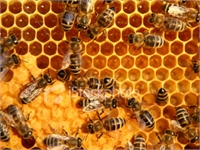
Home Remedies For Bee Stings
Important Notice: Our web hosting provider recently started charging us for additional visits, which was unexpected. In response, we're seeking donations. Depending on the situation, we may explore different monetization options for our Community and Expert Contributors. It's crucial to provide more returns for their expertise and offer more Expert Validated Answers or AI Validated Answers. Learn more about our hosting issue here.

Home Remedies For Bee Stings
You must be logged in to post a comment.
Home Remedies For Bee Stings
It sounds too good to be true, but the best homeopathic remedy for bee stings might come right from the bee itself. My grandmother was a firm believer in the healing power of bees. She believed honey was the cure-all for everything from sunburn to the flu. Heaven forbid if you were to tell her you weren’t feeling well because you would get a teaspoon of raw honey for a week until you told her you were feeling better.
Nature gives hundreds of insects that can bite and sting, but it also gives us an array of herbs that can reduce the itching and swelling and Mother Nature provides us with everything we need to prepare a multiple of home remedies for bee stings.
Generally, bees do not go looking for trouble. The rule of thumb here is if you do not go bothering them, chances are they will not go looking for you. But, if you do get stung, most bee stings cause little pain only lasting a few hours to a few days. If you are stung by a bee, the first thing you must do is remove the stinger as soon as possible using tweezers or a credit card, and you should trerat the wound with an antibiotic if available. Honey has antibacterial and antibiotic properties and may promote helpful bacteria and kill harmful bacteria. Honey also contains hydrogen peroxide.
Other homeopathic remedies for bee stings include ice to cool down the burning caused by the bee sting and it also aids to numb the skin from the pain associated with the sting. The ice should not be directly applied to skin for more than 20 minutes as it slows the blood flow to the cold area.
Some people use toothpaste because it is the most accessible item in most homes. Toothpaste contains glycerin which helps to dry the venom. Also, toothpaste is an alkaline substance and can help neutralize the acidic venom as well.
Aspirin is also readily available in many homes. Rubbing a wet aspirin on the area where you were stung can help neutralize some of the inflammation from the venom. If you are allergic or sensitive to aspirin taken by mouth, doctors recommend that you should not rub it on your skin as the same reation could occur.
Philip Koehler, PhD and Entomologist at the U.S. Department of Agriculture suggests making a paste of meat tenderizer and water and apply it to the sting. The meat tenderizer works because bee stings are made up of proteins that meat tenderizer can break down. Baking soda and water also works the same way.
Normal reactions to a bee sting is to experience pain and itching, redness and swelling. If the bee sting is inside your mouth or you have been stung a multiple of times, you should seek professional help at once. Some other sypmptoms you should seek a doctor if you are experiencing are: tongue swelling, dizziness, blurry vision, nausea, slurred speech, hives or abnormally large bee stings.
Some people are allergic to bee stings and anyone experiencing an allergic reaction needs emergency services because bee stings can trigger anaphylactic shock.